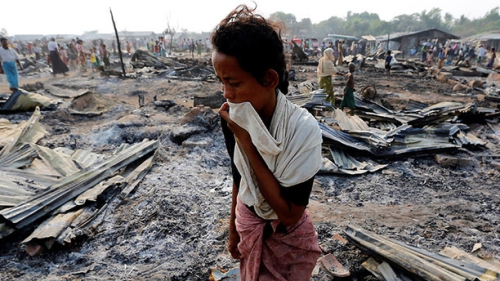Gambia's Jammeh takes on the West
Gambia’s President Yahya Jammeh has recently shown signs of exasperation with the link between foreign aid donations needed by his country and Western economic and political policy dictates. Although Jammeh -- who took power in a 1994 bloodless coup -- held democratic elections in 1996 and has since attempted to provide greater government transparency and make the economy suitable for foreign investment ventures, desperately needed foreign aid has actually decreased since the end of Sir Dawda Jawara’s 30-year dictatorship. Speaking to the BBC’ on June 9, Jammeh accused Western countries of acting in an undemocratic manner by both pushing their own versions of democracy and then only applying democratic standards selectively so as to not threaten their interests.
Many Western observers remain skeptical of Gambia’s transition to civilian rule, according to a September 1997 Africa Confidential report. After resigning from the military, Jammeh joined the Alliance for Patriotic Reorientation and Construction (APRC) and won the 1996 presidential election with 56 percent of the vote. Parliamentary elections likewise resulted in an APRC victory. But in the elections, contested by four parties, the government banned Jawara’s party. And the constitution approved by the new government was silent on key issues such as limiting the number of presidential terms.
A 1996 Amnesty International (AI) report notes that Gambia’s constitution threatens respect for human rights by retaining the death penalty, allowing for the dissolving of political parties in a state of emergency and granting amnesty to members of the former provisional military ruling council. In 1997, World Bank director for West Africa, Mahmood Ayub, accused Gambia of not being committed to the reduction of corruption where it exists and of insufficient progress in guaranteeing realistic wages to the country’s professionals. An April 1998 column in New Africa accuses Jammeh of press restrictions and the deportation of foreign journalists.
Such criticisms tend to strike a negative cord in the West and have therefore been detrimental with reference to Gambia’s attempts to mitigate its dire economic situation with foreign aid. Latest figures from the CIA show that Gambia is fighting an uphill battle. The country’s foreign debt stands at $426 million, tourism comprises 60 percent of its GNP and with limited resources it is indeed dependent on foreign aid.
But Jammeh has made concerted efforts to reform his government. Even if he has not been able to convince the West of his good intentions, there is no doubt that he has tried. In October 1998, he released all political detainees. In a speech quoted by New Africa, he fervently declared his willingness to pursue a new era of freedom, accountability, and transparency in governmental operation. He has set up an international commission with judges from Nigeria, Sierra Leone and Ghana to investigate government corruption. And in numerous conferences with various African states, he has affirmed his commitment to economic liberalization and free trade.
At 30 years of age, Jammeh is the youngest leader of any country in the world, yet he has proved himself a capable regional leader, participating in peace missions and negotiations in Liberia, Sierra Leone and most notably Guinea Bissau. His bold perspectives are perhaps colored by his youth, but he represents a new generation of increasingly dissatisfied Africans. As Jammeh remarked in a recent interview with GambiaNet, "I see myself as the one representing the interests of the African youth…who are unemployed, who are destitute, who have to hustle left and right in order to make a living and who are being used to fight wars that they do not understand, for ideologies that are not existent."
And Yahya Jammeh is not alone in his critique of Western hypocrisy in imposing political and economic reforms on developing countries. In terms of the economic effects of Western agendas in the developing world, Third World Network’s Martin Khor says that the colonial "division of labour" by which the master countries produced industrial products at high prices and the colonies exported raw materials at low prices continues today under such policies as free trade and liberalization. But Jammeh, speaking to the BBC, put it more bluntly: "After robbing us you tie a man’s hands behind his back and seize all his property and tell him, ‘Now before I give you back your property you must dance to my tune.’"
Jammeh also added that Western democratic standards are not necessary for Africa as African culture is imbued with its own traditional democratic institutions. Western countries, according to Jammeh, echo hollow ideals and show that they are not concerned with human rights as they consistently neglect African needs. He insists that "human rights must apply to everybody including those same countries that are talking about democracy, because if you are talking about democracy you must not be a racist, and they treat Africa with contempt. "
Zakariya Wright is a staff writer at iviews.com






